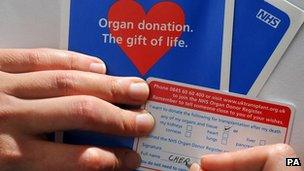Welsh government's 'opt out' organ donor consultation
- Published
- comments

Families would have no legal right to stop dead relatives' organs being used for transplant if the person has not opted out in advance, under a proposed Welsh law.
However, Health Minister Lesley Griffiths said she could not see a situation where doctors took organs without the permission of families.
Ministers are asking for views on plans for a "soft opt-out".
If it goes ahead, Wales would be the UK's first country with the system.
Ms Griffiths said the lack of organs and tissues caused unnecessary deaths and suffering.
The law, planned to be in place by 2015, would require people to opt out of donating their organs when they die, rather than opting in by signing the register.
Doctors' leaders hope it will "change cultural expectations" and prompt more family discussions about donation.
Ms Griffiths said, in practice, she did not think the proposals would mean families losing the ability to refuse the organs of loved ones being donated.
First Minister Carwyn Jones will unveil the plans at the transplant unit at the University Hospital of Wales, Cardiff, on Tuesday morning.
The system is designed to increase the number of organ and tissue donors, if legislation is approved.
The Welsh government's white paper sets out proposals for how the system would work:
- Only people aged 18 or over who both live and die in Wales would be included under the system
- People must have lived in Wales for a sufficient period of time before being included in the opt-out system - the white paper invites views on how long that period should be
- It proposes four options for how people's wishes on donation could be recorded - a register for Wales of persons who have not objected, and a register of persons who have objected; a register for Wales of only those persons who have not objected; a register for Wales of only those people who have objected; no registers but a record of objection given to and held by GPs.
Ms Griffiths said the Welsh government believed the legislation would go a long way to increasing the number of organs and tissues available.
"When people die, donation of their organs and tissues is often possible but currently does not happen - not because they did not wish to donate but because they never got round to joining the organ donor register," she said.
'Significant step'
"Repeated surveys show that the overwhelming majority of people in the UK and Wales believe in organ donation, but only one in three people in Wales have joined the organ donor register.
"Last year 67% of donors were not on the organ donor register. Therefore we believe creating an environment in which donation is the norm will enable more organs to be available."
The minister added: "Introducing a soft opt-out system will mean people are more likely to make decisions about donation during their lifetime and to have discussed their wishes with their family."
The British Heart Foundation called for the UK's other governments to follow Wales' lead, saying an opt-out system would prove to be the difference between life and death for many families.
"Wales has taken a substantial and significant step towards implementing a proven system that will see more heart patients receive the organs they need to stay alive," said Maura Gillespie, the foundation's policy and advocacy manager.
"An opt-out system would better reflect the wishes of the majority of people, and fill the void between good intention and action."
Roy J Thomas, chairman of Kidney Wales Foundation, described the government's plan as "a progressive move by Wales".
'Cultural expectations'
"The UK has one of the lowest donor rates in Europe," he said. "Wales will take the lead and show that we must presume to have conversations on this important issue."
Mr Thomas said presumed consent in itself was not the solution but rather a key facilitator within a well developed system and infrastructure for organ donation and transplantation.
"There has already been a significant increase in the number of donors in Wales to 66 in 2010/11 and the people of Wales understand this debate," he said.
Dr Tony Calland, chairman of the BMA's medical ethics committee, said it fully supported the move.
"The fact is that every year people die whilst waiting for organs, and evidence from other countries has shown that an opt-out system can address the shortage of organ donors and can save lives.
"We hope that a move to a soft opt-out system would change cultural expectations in society, and prompt more discussion within families about organ donation," he said.
But Glyn Davies, Conservative MP for Montgomeryshire, said he would be seeking time in Westminster to debate the issue.
Mr Davies said presumed consent would only deliver "a fraction more organs".
"One of the real problems I've got with presumed consent is that it undermines trust," he said.
"I don't mind moving towards a presumptive attitude because almost everybody is in favour of organ donation so it's reasonable to have a presumptive attitude.
"But if there's presumed consent, then there's a suspicion and I think that does affect trust."
Consultation on the proposals outlined in the white paper and closes on 31 January 2012.
The Welsh government said a bill would be introduced in 2012. Legislation could be in place by 2013 and a soft opt-out system could come into effect in 2015.
- Published6 November 2011
- Published4 October 2011
- Published21 September 2011
- Published12 July 2011
- Published9 March 2011